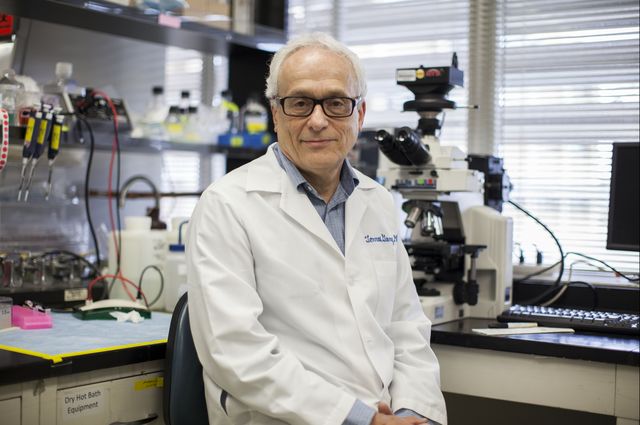Like many important discoveries, UCLA Professor Tom Ganz’s greatest scientific finding was unintentional.
"I accidentally discovered the hormone that controls iron," said the UCLA researcher and biological scientist. "It was an accident but it led me to start asking how we could make this discovery useful."
That hormone is hepcidin, the master regulator of iron metabolism. Hepcidin controls the absorption of iron from the diet and the transfer of iron from cellular stores into hemoglobin. His discovery is of real benefit to people living with diseases involving deficiencies or the maldistribution of iron in the body, including anemia, beta thalassemia and hemochromatosis. However, the benefit can only be realized if this finding leads to advanced medical therapies.
To date, Ganz and his research have been at the foundation of three UCLA startup companies, each designed to help translate his scientific work for the public good.
"I am happy every time we make an advance that leads to a potential medication," said Ganz, who is the scientific cofounder of Merganser Biotech and Silarus Therapeutics, and cofounder of Intrinsic LifeSciences.
Ganz will speak about his experience with translating research into products and services that benefit the public as part of Pathways to Commercialization, an event set for Monday, May 4. Attendees will hear about the major successes his companies have experienced to date, including a $28 million infusion of Series A funding for Merganser announced this year.
"When a company receives a vote of confidence by way of major investment, we know we’re on the right track with our ideas and approach," Ganz said.
The free panel discussion, which is hosted by the UCLA Office of Intellectual Property and Industry Sponsored Research (OIP-ISR) and the UCLA VC Fund, and sponsored by Gov. Jerry Brown’s GO-Biz Innovation Series, will be held at the California NanoSystems Institute at UCLA from 4-7 p.m. A networking reception will follow the discussion. Those who plan to attend are asked to register in advance.
In addition to Ganz, other panelists will include Farhad Parhami, a professor-in-residence in UCLA’s cardiology department and founder of MAX BioPharma, which uses Parhami’s research on specific lipid molecules to develop medical therapies; Frank Chang, a professor in electrical engineering and scientific advisor for Keysaa, which uses a technology developed by Chang to enable the transfer of large amounts of data and video between devices with unprecedented speed; and Leo Petrossian, a UCLA M.B.A. alumnus and cofounder and CEO of Neural Analytics, which aims to simplify brain injury diagnosis while reducing health care costs and improving patient outcomes.
From Silicon Valley to Silicon Beach
Although many people tend to associate innovation and commercialization with the Silicon Valley and San Diego, there is a lot of valuable work coming out of Los Angeles and Westwood, said Heather Felix, campus relations manager for OIP-ISR.
"It’s important for people to understand what a vibrant entrepreneurial ecosystem we have at UCLA," said Felix. "It’s also important to get the work of UCLA researchers out to the public. The only way these technologies are going to do anyone any good is by getting them into the marketplace."
That’s where OIP-ISR comes in.
The office, which manages 912 active U.S. patents and 2,950 inventions, supports UCLA’s mission of teaching, research and service by working with UCLA researchers to help them understand how to transfer their ideas and technologies into products and services that benefit the public. This, in turn, leads to the creation of companies that provide an economic boost for the city and the state, and jobs for Californians.
In fiscal year 2014, UCLA researchers disclosed 492 inventions, earned 240 industry-sponsored research awards and received 97 U.S patents. In addition, 86 new UCLA inventions were licensed to companies. As an institution, UCLA earned $39.2 million in licensing revenue and another $39.1 million in industry-sponsored research.
Ganz said that working with the professionals in OIP-ISR has enabled him to stick to what he does best, biomedical research, while guiding him through the business of science, which can be difficult for researchers to navigate.
"They put me in touch with entrepreneurs, help protect our intellectual property and develop the best strategies to look for potential investors and experts who will take the discoveries further," he said. "They are very good at this."
Celebrating startups
UCLA has a strong reputation for launching successful startups. In fact, UCLA ranks among the top five college campuses in the nation when it comes to starting new companies. Last year alone, 22 new ventures were created, including Ganz’s Silarus Therapeutics. They add to the nearly 140 startups that are currently working on bringing scientific discoveries developed at UCLA to the public.
Additionally, such companies generate revenue for the campus and benefit the economy by creating jobs and contributing to the tax base. According to the 2013 UCLA Economic Impact Report, UCLA startups have resulted in the creation of more than 4,400 jobs; $295 million of employee compensation; $108 million in federal, state and local tax revenue. All told, UCLA startups have contributed a total of $1.1 billion to the economy.





